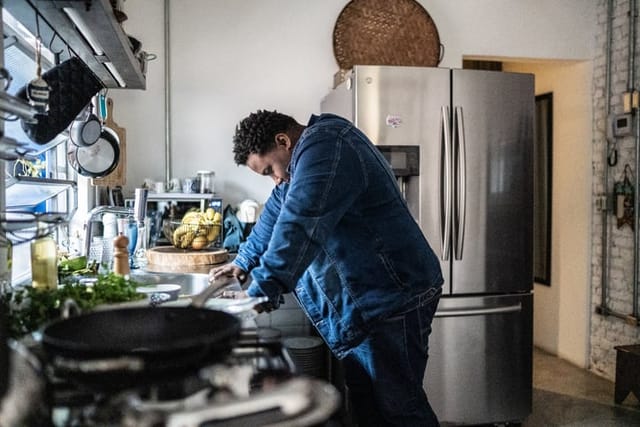Feeling like a constant cloud of gloom in a room full of sunshine? It’s a bummer, and it might have more to do with your own habits and thoughts than anything external. Here are some of the reasons why you might be feeling chronically unhappy and how to start shifting those vibes.
1. You compare yourself to everyone else.

Social media is a highlight reel, making it easy to feel like everyone’s having more fun than you. Remember, comparison is the thief of joy. Focus on your own journey, not someone else’s curated online life. Comparing yourself to other people fuels insecurity and creates a false sense of inadequacy. Embrace your unique path and celebrate your own wins, no matter how small they may seem.
You may also like: Things Narcissists Say To Shut You Down When You Confront Them
2. You hold on to grudges.

Anger and resentment are like carrying a heavy rock around. Forgiveness doesn’t condone bad behavior, but it frees you from the negativity they harbor. Let go of the past for your own peace of mind. Remember, forgiveness isn’t about the other person, it’s about releasing the burden you’ve been carrying for your own well-being.
Don’t miss out – follow Bolde for exclusive content daily
3. You’re a chronic complainer.

Focusing on the negative creates a never-ending cycle of bad vibes. Practice gratitude instead – even a small list of good things can shift your mood. A complaining habit repels people and reinforces negativity in yourself. Try to find something positive in challenging situations – it builds resilience and helps you see the bigger picture.
You may also like: Don’t Share These 15 Things With Anyone — They’re Nobody’s Business But Yours
4. You think happiness is a destination.

“I’ll be happy when…” is a trap. Happiness is found in the journey, the little moments, and the choices you make every day. Stop waiting for some external change to bring joy. Start finding joy in your present circumstances, no matter how imperfect they might be.
Don’t miss out – follow Bolde for exclusive content daily
5. You’re always waiting for the other shoe to drop.

If you constantly expect things to go wrong, they probably will (self-fulfilling prophecy!). Try to approach situations with optimism and resilience, so you’re ready for challenges but not consumed by anxiety. Expecting the worst makes it difficult to enjoy good moments and attracts further negativity.
You may also like: 18 Personality Traits Of An Unhappily Married Man
6. You’re stuck in the past.

Dwelling on regrets or past hurts keeps you trapped. Learn from the past, but don’t let it hold you hostage in the present. Focusing on what you can change now is empowering, while constantly reliving the past breeds helplessness. Accept what has happened and focus on what you can control in the present to create a better future for yourself.
Don’t miss out – follow Bolde for exclusive content daily
7. Your self-talk is seriously negative.

Would you talk to a friend the way you talk to yourself? If not, it’s time to retrain your inner voice. Be kind and encouraging to yourself – it builds resilience and confidence. Challenge those negative thoughts and replace them with more compassionate and helpful self-talk.
You may also like: 16 Signs You Didn’t Get Enough Affection As A Child
8. You’re addicted to drama.

Maybe chaos feels exciting or a bit distracting. But constant drama is exhausting for everyone involved, especially yourself. Healthy relationships thrive on calm and support, not rollercoasters of conflict. Seek to resolve conflict peacefully and prioritize stability over emotional turbulence in your relationships.
Don’t miss out – follow Bolde for exclusive content daily
9. You make everything about you.

Constantly turning conversations back to yourself is alienating. Show genuine interest in the people around you – it builds connections and makes you a much more pleasant person to be around. Ask open-ended questions and actively listen to people’s responses. Focus on learning about other people and offering support when appropriate.
You may also like: How A Narcissist Acts When They Can’t Fool You Anymore
10. You expect people to fix your problems.

Happiness is an inside job. Blaming everyone else for your unhappiness keeps you stuck in a victim mentality. Take ownership of your choices and your well-being. While it’s okay to seek support from other people, remember that true change starts within yourself.
Don’t miss out – follow Bolde for exclusive content daily
11. You’re surrounded by negative people.

The company you keep has a huge impact on your mood. If your friends are always complaining or dragging you down, it’s time to re-evaluate. Seek supportive, positive people who lift you up. Limit your exposure to negativity and surround yourself with people who inspire and encourage you.
You may also like: 15 Things To Keep To Yourself Because They’re Nobody’s Business But Yours
12. You say “yes” when you mean “no.”

People-pleasing leads to resentment and burnout. Learn to set healthy boundaries and say no without guilt. It’s okay to prioritize your own needs. Remember that saying “no” can be an act of self-care and allows you to say “yes” to what truly matters.
Don’t miss out – follow Bolde for exclusive content daily
13. You don’t take care of yourself.

Your physical and mental health are intertwined. Eat well, get enough sleep, exercise, and find healthy ways to manage stress. It’s hard to feel good if you’re neglecting your basic needs. Make small, sustainable changes to your lifestyle that prioritize your health and well-being.
You may also like: How A Narcissist Acts When You Start Seeing Through Their BS
14. You’re not living according to your values.

If your life feels out of alignment with who you are deep down, it creates a nagging feeling of unease. Take time to identify your core values and make choices that honor them. Living in alignment with your values brings a sense of authenticity and purpose.
Don’t miss out – follow Bolde for exclusive content daily
15. You’re afraid of vulnerability.

Putting up walls keeps people at a distance. True connection requires letting your authentic self be seen, flaws and all. Vulnerability is scary, but it’s the birthplace of joy and genuine relationships. Start by sharing something small and genuine with someone you trust.
You may also like: People Who Had Unhappy Childhoods Usually Develop These Traits
16. You avoid making connections with people.

Avoidance isn’t intriguing, it’s isolating. If crowds are tough, start small: try a genuine smile or comment to one person. Small victories build social confidence over time, and people appreciate the effort. Remember, reaching out, even in small ways, can break down the barriers that social anxiety creates.
Enjoy this piece? Give it a like and follow Bolde on MSN for more!



